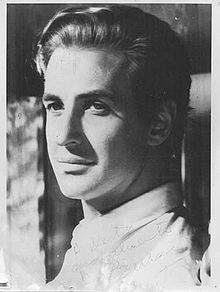- Duilio Marzio
-
Duilio Marzio (born November 27, 1923) is a well-known Argentine cinema and theatre actor.
Life and work
He was born Duilio Perruccio in Buenos Aires to Sicilian immigrants, in 1923. He enrolled at the University of Buenos Aires Law School, obtaining a juris doctor. Shortly afterwards, however, his interest in the theatre lured him away from his post in a local law firm, and he first starred on the stage in 1949 opposite Paulina Singerman in Antonio Cunill Cabanellas' Fin de semana (Weekend).[1]
His friendship with actor Pepe Soriano helped persuade him to continue acting, against his father's wishes. He starred with Soriano in numerous plays from 1951 on and in 1953, he was offered his first film role.[2] The starring role opposite Diana Maggi in period piece film maker Leopoldo Torre Nilsson's La tigra (The Tiger) led to frequent subsequent roles, both leading and secondary. He worked for Torre Nilsson again in 1959, starring in La caída (The Fall).[3]
These roles in film and theatre earned Marzio a fellowship to Lee Strasberg's prestigious New York City drama school, the Actors Studio, in 1960.[1] Marzio was a guest in Strasberg's apartment during his two-year stay in New York, and was the only Argentine actor so honored by the iconic method acting instructor.[4] His memorable stay in the United States included Strasberg's lending him a car with which he traveled to California.[1]
He returned to star in Ralph Pappier's Operación G and Fernando Ayala'a Paula cautiva with Susana Freyre, a regular co-star of his in the theatre. He was cast as himself in 1964 for Daniel Tinayre's adaptation of French author Guy des Cars' Cette étrange tendresse (Strange Tenderness). Aside from a cameo, however, he then left the cinema until 1974, when he led the cast in Bernardo Arias' El fuego del pecado.[3] A dearth in Argentine film production during the dictatorship installed in 1976, helped lead to another long hiatus from cinema, and Marzio worked both in the theatre and television.
Marzio returned to film in Raúl de la Torre 1986 period piece, Pobre mariposa (Poor Butterfly), and starred with American actor Don Stroud in a 1988 U.S.-Argentine production, Two to Tango. A 1992 adaptation of Albert Camus's The Plague (directed by Luis Puenzo) also included the steely-eyed Marzio, and also worked with French actress Dominique Sanda and Federico Luppi in Edgardo Cozarinsky's Guerriers et captives (Warriors and Prisoners).[3]
In Pablo Parés' gothic Jennifer's Shadow (2004), Marzio was cast as the concerned mystic, "Darío Bardevil," and starred with Faye Dunaway. Alejandro Doria directed Marzio in the 2006 historical drama, Las manos (The Hands) and musician/filmmaker Fito Páez cast him as the dictator in his satirical ¿De quién es el portaligas? (Whose Belt is This?).[3] He continues to work in the theatre, as well, recently acting in a stage adaptation of Hungarian writer Sándor Márai's The Last Encounter.[1]
Marzio, whose several lengthy relationships never led to marriage, is fond of a line in Federico Fellini's La strada:
“ Every stone in life has its reason for being there.[1] ” References
External links
Categories:- Argentine film actors
- Argentine stage actors
- Argentine television personalities
- University of Buenos Aires alumni
- Actors Studio alumni
- Argentine people of Sicilian descent
- People from Buenos Aires
- 1923 births
- Living people
Wikimedia Foundation. 2010.

